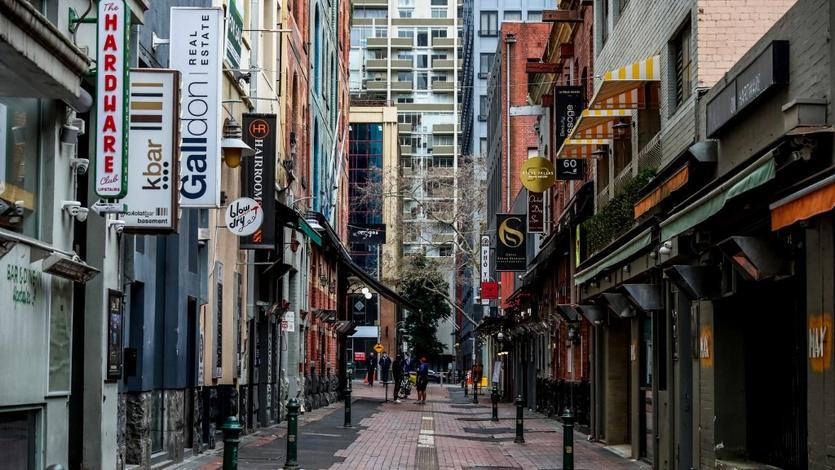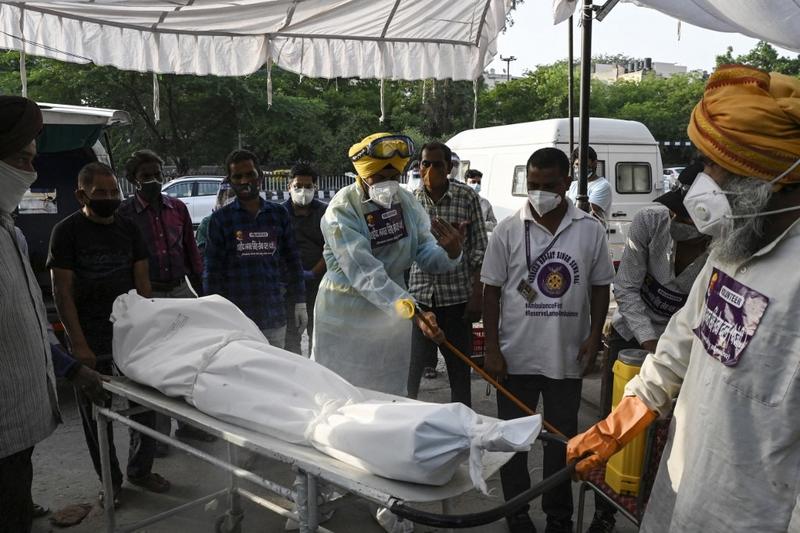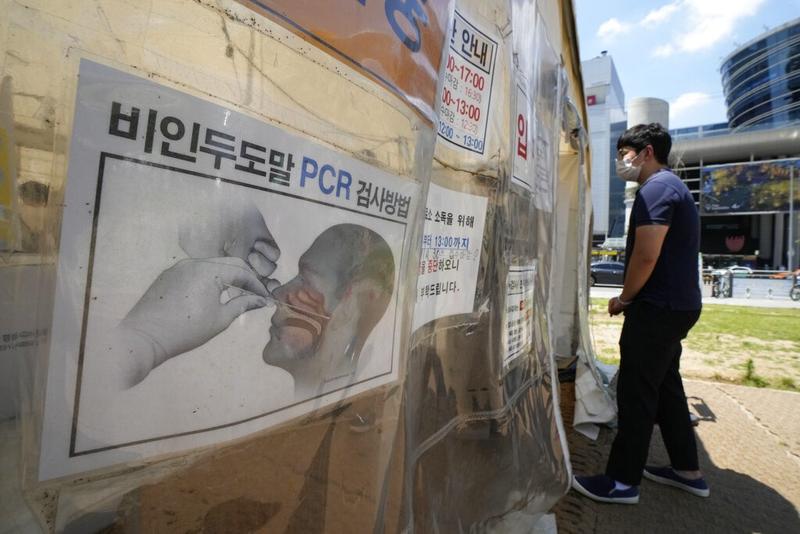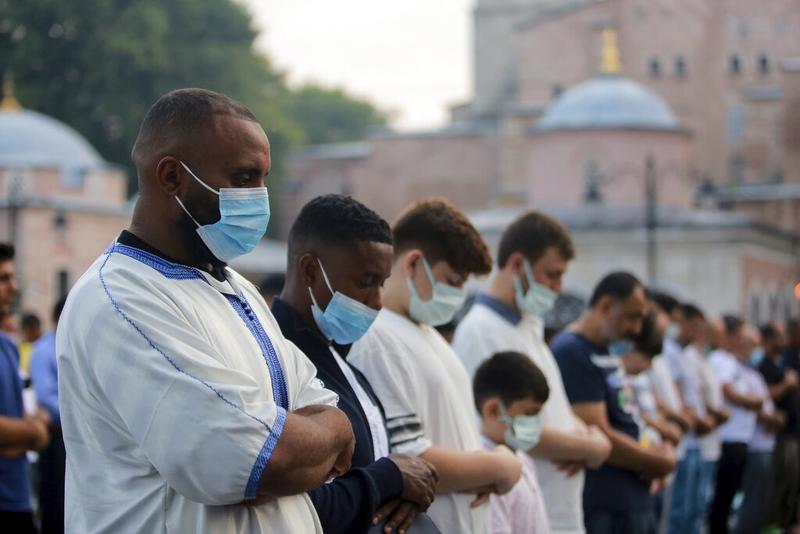 In this Nov 3, 2020 photo, morning commuters wearing protective masks cross a road in the central business district of Singapore. (LAURYN ISHAK / BLOOMBERG)
In this Nov 3, 2020 photo, morning commuters wearing protective masks cross a road in the central business district of Singapore. (LAURYN ISHAK / BLOOMBERG)
DHAKA / ISTANBUL / SINGAPORE / TEHRAN / ANKARA / JERUSALEM / TOKYO / SYDNEY / SEOUL / BANGKOK / MANILA / JAKARTA / PHNOM PENH / ULAN BATOR / HANOI / VIENTIANE - Singapore leaders have justified a recent anti-COVID-19 crackdown by warning about the impact the virus could have on unvaccinated senior citizens. The data shows it’s younger people who are getting infected in greater numbers.
The sharp rise in cases that sparked tighter group limits and the reimposition of a ban on dining-in has largely been affecting the city-state’s younger - and least fully-vaccinated - population, according to data from the Ministry of Health.
Like elsewhere, seniors, the most vulnerable group to COVID-19, were among the first to be offered vaccinations in the island-state while under 40s were offered slots in June. Almost 80 percent in the latter group have had their first dose and most of them are awaiting the second. Singaporeans in this group were given priority over long-term pass holders, largely foreign workforce and expats who could book their first vaccination for the start of this month.
Singapore reported more than 160 local cases over each of the past three days, despite having logged zero as recently as July 10. This comes as the government ramps up its campaign to vaccinate those above 70, who are seen to be the most vulnerable if infected with the disease.
Cases among the younger population could be of concern to authorities as well since these people could accidentally pass the virus on to seniors in the community, or when visiting relatives. There were 400 local cases among people aged 19 to 39 years old in the last 14 days, compared to 59 cases among those above 70 years old, according to the data on Wednesday.
In a Facebook post on Wednesday, Singapore’s Health Minister Ong Ye Kung explained that the recent clampdown is because of a cluster at a fishery port, with fishmongers spreading cases at markets where they also work. “Markets are frequented by seniors, many of whom remain unvaccinated. This is most worrying, and we are at risk of an uncontrollable rise in cases, which could potentially result in many severe illnesses or even deaths. So we need to preemptively tighten up social activities,” he said.
Currently, there are seven cases of serious illness requiring oxygen supplementation, and one in critical condition in the intensive care unit, all of whom are aged above 60 years old. Of them, six are completely unvaccinated and the remaining two are partially vaccinated. A little over 70 percent of those 70 years old and above are fully vaccinated so far, according to the Ministry of Health data.
The government has ramped up measures to get the elderly vaccinated, including through enlisting the help of doctors and polyclinics to encourage the seniors to get their jab. Mobile vaccination teams have also been deployed to ease the process.
 A family member visits his relative's grave at a cemetery for coronavirus victims in Rorotan, Jakarta, on July 22, 2021. (BAY ISMOYO / AFP)
A family member visits his relative's grave at a cemetery for coronavirus victims in Rorotan, Jakarta, on July 22, 2021. (BAY ISMOYO / AFP)
WHO
The World Health Organization (WHO) on Thursday urged Indonesia to implement a stricter and wider lockdown to combat surging COVID-19 infections and deaths, just days after the country’s president flagged the easing of restrictions.
Indonesia has become one of the epicentres of the global pandemic in recent weeks, with positive COVID-19 cases leaping fivefold in the past five weeks. This week, daily deaths hit record highs over 1,300, among the highest tolls in the world.
In its latest situation report, the WHO said strict implementation of public health and social restrictions were crucial and called for additional “urgent action” to address sharp rises in infections in 13 of Indonesia’s 34 provinces.
“Indonesia is currently facing a very high transmission level, and it is indicative of the utmost importance of implementing stringent public health and social measures, especially movement restrictions, throughout the country,” it said.
Under Indonesia’s partial lockdown, social restrictions such as work-from-home and closed malls are limited to the islands of Java and Bali and small pockets in other parts of the country. Large sectors of the economy deemed critical or essential are exempt from most, or some, of the lockdown measures.
On Tuesday, President Joko Widodo flagged an easing of restrictions from next week, citing official data showing a fall in infections in recent days, which epidemiologists say has been driven by a drop in testing from already low levels.
“If the trend of cases continues to decline, then on July 26, 2021, the government will gradually lift restrictions,” Jokowi, as the president is known, said.
 This photo shows a general view of an empty cafe and restaurant laneway in Melbourne on July 16, 2021, after Australia's second largest city entered a fresh lockdown amid a resurgence in coronavirus cases. (ASANKA BRENDON RATNAYAKE / AFP)
This photo shows a general view of an empty cafe and restaurant laneway in Melbourne on July 16, 2021, after Australia's second largest city entered a fresh lockdown amid a resurgence in coronavirus cases. (ASANKA BRENDON RATNAYAKE / AFP)
Australia
Australia's prime minister apologized for a sluggish COVID-19 vaccination program on Thursday, while the country's most populous state reported its biggest one-day spike in infections in 16 months and warned cases would likely rise further.
Australia was widely lauded for containing the pandemic in 2020, but it has struggled this year to slow the spread of the highly contagious Delta variant even with more than half its 25 million population under a weeks-long lockdown.
The curbs, which Treasurer Josh Frydenberg said was costing the economy about A$300 million (US$220 million) daily, and the likelihood that they will stay in place with less than 15 percent of the adult population fully vaccinated have stoked public anger.
"I'm sorry that we haven't been able to achieve the marks that we had hoped for at the beginning of this year," Prime Minister Scott Morrison told reporters in Canberra.
Australia has been administering less than 150,000 vaccines each day, well behind other developed nations.
More than half of Australia's 25 million population, including the country's largest city of Sydney and the states of Victoria and South Australia, is under lockdown, with residents restricted to their homes except for urgent reasons.
Sydney, the worst affected city, is in a five-week lockdown until July 30 although a growing number of cases where people have been infectious in the community has raised the prospect of the tough restrictions extended further.
South Australia, meanwhile, is bracing for more cases on Thursday as officials track two chains of transmission - a winery and a Greek restaurant in the state capital Adelaide. Five of the six cases reported late on Wednesday were linked to the winery.
New South Wales (NSW), Australia's most populous state, on Thursday reported its biggest daily rise in locally acquired cases of COVID-19 for this year. A total of 124 local cases were reported, up from 110 a day earlier, taking total infections in the worst outbreak of the year to more than 1,600.
Neighbouring Queensland state closed its border to NSW, citing the outbreak, shutting off one of the most travelled routes in the country.
Bangladesh
Bangladesh reported 7,614 new COVID-19 cases and 173 more deaths on Wednesday, making the tally at 11,36,503 and death toll at 18,498, the Directorate General of Health Services (DGHS) said.
The official data showed that 24,979 more samples have been tested across Bangladesh as of Wednesday morning.
Cambodia
Cambodia's COVID-19 case total has risen to 70,419 on Thursday after 811 fresh infections were reported across the country, the Ministry of Health (MoH) said in a statement.
The new infections included 511 local cases and 300 imported cases, the ministry said.
Twenty more fatalities had been confirmed, bringing the overall death toll to 1,188, according to the ministry.
ALSO READ: NZ PM: Accelerating access to COVID-19 vaccines a priority
India
India’s actual death toll from COVID-19 could range between 1.3 million to a staggering 5 million, with even the most conservative estimate putting its tally at more than double the US, the highest recorded in the world so far.
Bloomberg approached authorities in about half of India’s 28 states and territories seeking death data from April and May for the last two years and analyzed figures from researchers and experts.
The result is clear: the real toll has been vastly underestimated because of a combination of under-counting, a backlog in the civil registration system and a lack of testing leading to COVID-19 deaths being classified as other conditions like heart disease.
The findings dovetail with estimates from researchers around the world. Bhramar Mukherjee, a professor at the School of Public Health at the University of Michigan, has devoted much of the past year to modeling India’s pandemic. Her studies suggest the death toll is around 1.3 million up to June 15.
 In this photograph to taken on May 12, 2021, volunteers carry the body of a COVID-19 victim at a crematorium in New Delhi. (ARUN SANKAR / AFP)
In this photograph to taken on May 12, 2021, volunteers carry the body of a COVID-19 victim at a crematorium in New Delhi. (ARUN SANKAR / AFP)
A report from the Washington-based Center for Global Development think tank released Tuesday studied data from three different sources, finding that excess deaths — a term public health experts use to describe mortality from all causes during a crisis that is above what would have been expected in ‘normal’ conditions — likely ranged between 3.4 million to 4.9 million.
“Regardless of source and estimate, actual deaths during the COVID pandemic are likely to have been an order of magnitude greater than the official count,” said the report, co-authored by Arvind Subramanian, former chief economic adviser to the Indian government and two other researchers.
“True deaths are likely to be in the several millions, not hundreds of thousands, making this arguably India’s worst human tragedy since partition and independence.”
While under-reporting of COVID-19 fatalities is a global phenomenon, the problem is aggravated in India because deaths were already poorly counted before the pandemic. Only 92 percent of all deaths are registered and only a fifth of those are properly medically certified.
“Not capturing a death is dishonor to a life,” said Mukherjee. “Without relating the deaths and hospitalizations to vaccine and variant data, we will never be able to grasp the effectiveness of vaccines or clinical lethality of the variant.”
Separately, India reported on Thursday 41,383 new coronavirus infections in the last 24 hours, while daily deaths rose by 507, health ministry data showed.
The country's tally of infections now stands at 31.26 million, with the death toll at 418,987, according to government data.
Iran
Iran reported on Wednesday 27,379 new COVID-19 cases, taking the country's total infections to 3,603,527.
The pandemic has so far claimed 87,837 lives in Iran, up by 213 in the past 24 hours, the Iranian Ministry of Health and Medical Education said in a briefing published on the ministry's official website.
Israel
Israel's Ministry of Health reported 1,389 new COVID-19 cases on Wednesday, bringing the tally in the country to 855,552.
The number of active COVID-19 cases in Israel increased by 760 to 9,134, the highest since March 28, the ministry said.
The death toll from the virus in Israel rose by two to 6,454. The total recoveries from the disease climbed to 839,964 after 627 newly recovered cases were added, it added.
 In this file photo dated June 17, 2021, people walk past a big screen as Japanese Prime Minister Yoshihide Suga holds a news conference in a live broadcasting on the current state of Japan's response to the coronavirus, in Tokyo.
(EUGENE HOSHIKO/AP)
In this file photo dated June 17, 2021, people walk past a big screen as Japanese Prime Minister Yoshihide Suga holds a news conference in a live broadcasting on the current state of Japan's response to the coronavirus, in Tokyo.
(EUGENE HOSHIKO/AP)
Japan
Daily coronavirus infections in Tokyo rose to 1,979 cases on Thursday, the city said, the highest level since January, as Japan’s capital readied for the opening of the Olympic Games on Friday.
The rate was 671 more cases than the Thursday last week.
Japan's Prime Minister Yoshihide Suga is preparing to negotiate directly with the chief executive of Pfizer as soon as this week for early delivery of 20 million vaccine doses, domestic media reported on Thursday.
Suga is planning to meet the executive in person in Tokyo, media reported, citing government sources.
Laos
Laos reported a new record high of 256 new COVID-19 cases on Thursday, its highest daily caseload ever recorded since the first case was reported in the country.
Deputy Director General of the Department of Communicable Diseases Control under the Lao Ministry of Health Phonepaserd Sayamoungkhoun told a press conference in Lao capital Vientiane on Thursday that new cases included 254 imported cases and two local transmissions.
Mongolia
Mongolia on Thursday reported 1,309 new locally transmitted COVID-19 infections over the past 24 hours, pushing the national tally to 152,539, the country's health ministry said.
Six more deaths were reported in the past day, bringing the national counts to 782.
New Zealand
New Zealand is assessing whether to pause all quarantine-free travel from Australia, the New Zealand Herald reported, without saying where it got the information.
Cabinet ministers are holding a special meeting Thursday “to check in on the arrangements with Australia given the situation,” the newspaper reported, citing a statement from Prime Minister Jacinda Ardern’s office.
ALSO READ: S.Korean youth fight 'click war' in hunt for COVID-19 vaccines
 A man waits to get coronavirus testing at a makeshift testing site in Seoul, South Korea on July 16, 2021. (AHN YOUNG-JOON / AP)
A man waits to get coronavirus testing at a makeshift testing site in Seoul, South Korea on July 16, 2021. (AHN YOUNG-JOON / AP)
South Korea
South Korea's daily COVID-19 cases broke records for two straight days amid the cluster infections in the Seoul metropolitan area, the health authorities said Thursday.
The country reported 1,842 more cases of the COVID-19 for the past 24 hours, raising the total number of infections to 184,103.
It marked the highest-ever daily caseload since the country's first case was found in January last year. It was slightly up from the previous high of 1,781 tallied in the prior day.
The daily caseload hovered above 1,000 for 16 straight days. The daily average caseload for the past week was 1,513.
The recent resurgence was attributable to cluster infections in Seoul and its surrounding Gyeonggi province as well as imported cases.
Three more deaths were confirmed, leaving the death toll at 2,063. The total fatality rate stood at 1.12 percent.
Thailand
Thailand on Thursday reported 13,655 coronavirus cases, a daily record for a second consecutive day and bringing the country's total accumulated cases to 453,132.
The COVID-19 task force also reported 87 additional deaths, bringing total fatalities to 3,697.
The Philippines
China delivered an additional batch of Sinovac CoronaVac vaccines to the Philippines on Thursday to support the Southeast Asian country's campaign against the COVID-19 pandemic.
Health Secretary Francisco Duque and Carlito Galvez, the official in charge of vaccine procurement, received the fresh shipment of CoronaVac purchased from the Chinese manufacturer, which arrived before 8 am local time at the airport.
The Philippines has administered more than 15.6 million doses of COVID-19 vaccines as of July 20. More than 5 million people have been fully vaccinated against COVID-19 so far. The government aims to vaccinate up to 70 million people this year.
The Philippines' Department of Health (DOH) reported on Thursday 5,828 new COVID-19 infections, bringing the total number of confirmed cases in the Southeast Asian country to 1,530,266.
The death toll climbed to 26,891 after 17 more patients died from the viral disease, the DOH said.
 Muslims wearing face masks offer prayers during the first day of the Eid al-Adha, outside the iconic Haghia Sophia mosque in the historic Sultan Ahmed district of Istanbul on July 20, 2021. (MUCAHID YAPICI / AP)
Muslims wearing face masks offer prayers during the first day of the Eid al-Adha, outside the iconic Haghia Sophia mosque in the historic Sultan Ahmed district of Istanbul on July 20, 2021. (MUCAHID YAPICI / AP)
Turkey
Turkey is inoculating citizens against COVID-19 without intermission during the Eid al-Adha holiday, local media reported Wednesday.
According to the state-run Anadolu agency, mobile healthcare vaccination teams have been deployed to several locations across the country to provide services to holidaymakers.
It said 35 teams with more than 100 personnel have been vaccinating citizens at on-site clinics in the western province of Izmir. The inoculation spots include main squares, busy streets, ferry ports, and train and metro stations across Izmir.
Turkey's Health Minister Fahrettin Koca also urged citizens to get vaccinated at the place where they spend the holiday.
Turkey on Wednesday registered 8,151 new COVID-19 cases, raising its tally of infections to 5,554,317, according to its health ministry.
The death toll from the virus in Turkey rose by 59 to 50,709, while 4,946 more people recovered in the last 24 hours.
Vietnam
Vietnam is in talks with the United States on domestic production of mRNA vaccines, its foreign ministry said on Thursday, as the country looks to boost supplies amid its worst coronavirus outbreak yet.
After reining in the virus for much of the pandemic, Vietnam faces a surge in daily infections. It has imposed strict curbs on movement in about a third of the nation, including the commercial hub of Ho Chi Minh City and the capital, Hanoi.
Local production of the unidentified mRNA vaccine could begin in the fourth quarter or early in 2022, foreign ministry spokeswoman Le Thi Thu Hang told a regular news briefing, adding that Vietnam could produce 100 million to 200 million doses a year under such a deal.
US drug firms Pfizer and Moderna, which use new messenger RNA (mRNA) technology in their vaccines, did not immediately reply to Reuters’ requests for comments.
Such vaccines contain no actual virus, instead providing instructions for human cells to make proteins that mimic part of the coronavirus. These instructions spur the immune system into action, turning the body into a virus-zapping vaccine factory.
The health ministry reported 6,194 new COVID-19 infections on Thursday, a record daily increase. This raised Vietnam’s overall total of cases to 74,371, with 370 deaths.


